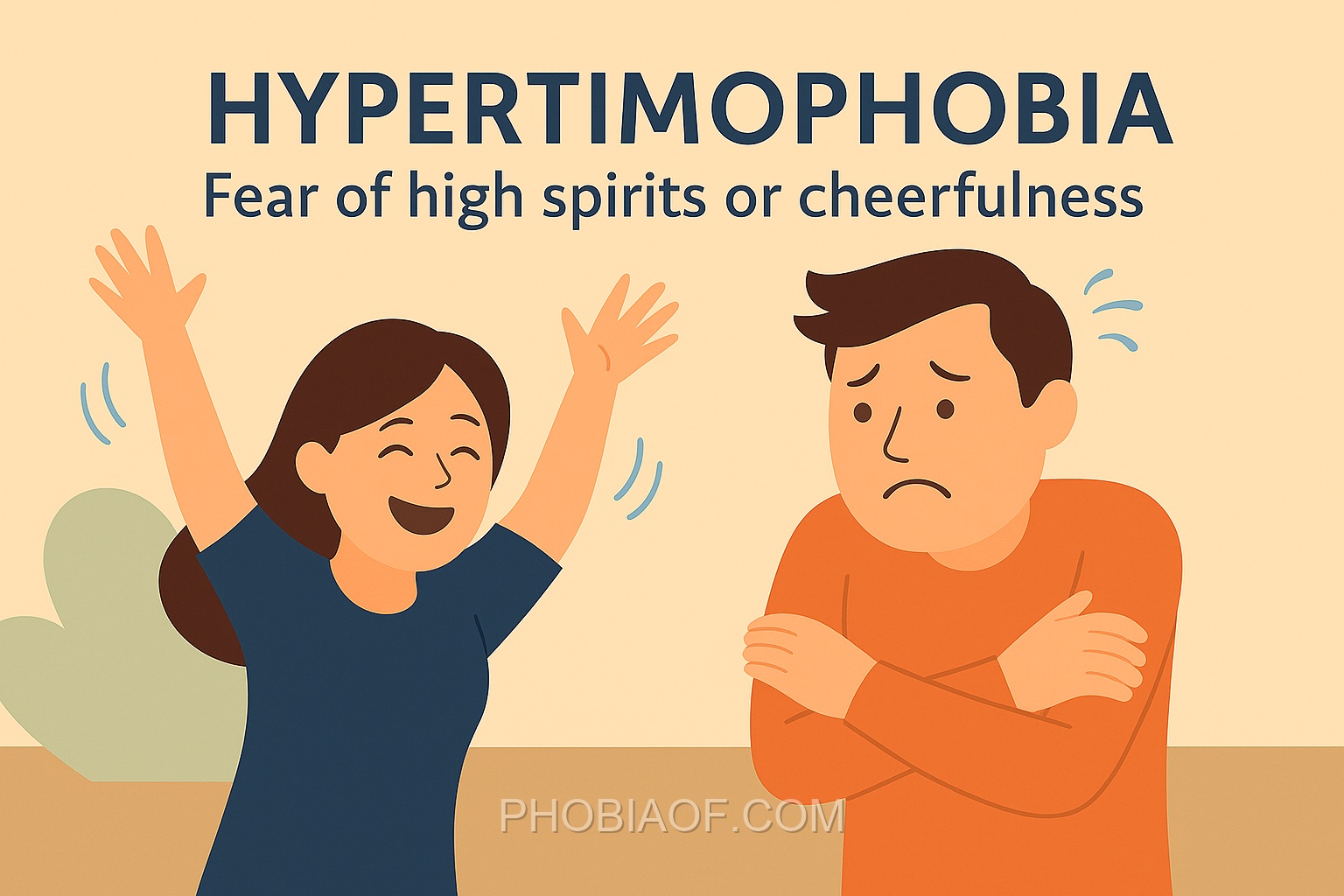Have you ever felt uneasy in overly cheerful situations, as if the bubbling energy around you was too overwhelming to handle? If so, you might be experiencing something known as Hypertimophobia. This term might sound complex, but it simply refers to the fear of high spirits or excessive cheerfulness.
Derived from the Greek words “hyper,” meaning “over” or “excessive,” and “thymos,” which translates to “spirit” or “emotion,” Hypertimophobia captures the anxiety that some individuals feel when confronted with exuberant or highly spirited environments. While many find joy and comfort in such uplifting atmospheres, those with Hypertimophobia may experience discomfort, tension, or even panic.
Generally, this phobia can manifest in various ways, affecting people differently:
- Some may feel stressed or anxious in lively gatherings or celebrations.
- Others might avoid places known for their cheerful ambiance, such as parties or concerts.
- There could be a sense of unease when interacting with overly enthusiastic individuals.
For those affected, Hypertimophobia can influence social interactions and personal relationships, as the desire to avoid high-spirited environments might lead to isolation or misunderstandings with others who do not share the same sensitivities. Recognizing and understanding this phobia is the first step toward managing its impact, and seeking professional guidance can help individuals navigate these feelings with greater ease and resilience.
Causes of Hypertimophobia
Hypertimophobia, the fear of time, can stem from various causes. Understanding these potential origins can help in addressing and managing the fear. Here are some common reasons why someone might develop this phobia:
- Genetic Predisposition:
Some individuals may have a genetic tendency towards anxiety disorders, including specific phobias like hypertimophobia. A family history of phobias or anxiety might increase the likelihood of developing similar conditions.
- Traumatic Experiences:
Experiencing or witnessing a traumatic event related to time, such as a significant loss or a pressured deadline, can trigger hypertimophobia. The fear often arises as a way to cope with the distressing experience.
- Learned Behavior:
Observing others who exhibit a fear of time can lead to developing the same phobia. This learned behavior often occurs in familial settings where children mimic the anxieties of parents or siblings.
- Psychological Factors:
Underlying anxiety disorders or a predisposition to overthink and worry about the future can contribute to hypertimophobia. People who struggle with managing uncertainty might be more prone to this fear.
- Environmental Factors:
Stressful environments where time is heavily emphasized, such as high-pressure jobs or academic settings, can exacerbate fears related to time. These settings can create a sense of urgency and anxiety around time management.
Interestingly, some theories suggest that the fear of time may also be linked to existential concerns. The awareness of time inevitably passing and the finite nature of life can trigger deep-seated fears about time’s passage and mortality.
Research on hypertimophobia is still evolving, but these insights provide a foundation for understanding its origins. Recognizing the potential causes can guide effective strategies for overcoming this fear.
Symptoms of Hypertimophobia
Hypertimophobia is characterized by an intense fear or anxiety related to excessive awareness of time passing. This phobia can significantly impact an individual’s emotional and physical state. Those experiencing hypertimophobia may present with a range of symptoms, including:
Physical Symptoms:
- Panic attacks, which may include feelings of losing control, trembling, or chest pain
- Profuse sweating, even in cool conditions
- Rapid heartbeat or palpitations
- Shortness of breath or difficulty breathing
- Dizziness or lightheadedness
Emotional and Behavioral Symptoms:
- An overwhelming sense of dread or fear when thinking about the passage of time
- Avoidance of situations or conversations that remind them of time passing
- Feelings of helplessness or being trapped
- Obsessive thoughts about the future and the inability to enjoy the present
- Difficulty concentrating due to intrusive thoughts about time
When severe, these symptoms can interfere with daily life, making it challenging for individuals to engage in routine activities, maintain relationships, and perform effectively at work or school.
Treatment for Fear of High Spirits or Cheerfulness
Hypertimophobia, or the fear of high spirits and cheerfulness, can be a challenging experience, but it’s important to know that this phobia is treatable and manageable over time. With the right approach and support, you can overcome this fear and lead a more balanced life.
Proven Therapies
Several therapeutic options have been proven effective in treating hypertimophobia. Here are some of the most common:
- Exposure Therapy: This therapy involves gradually facing the fear of high spirits or cheerfulness in a controlled and safe environment. By slowly exposing yourself to situations that trigger your phobia, you can reduce your anxiety over time.
- Cognitive-Behavioral Therapy (CBT): CBT is designed to help change the fearful thoughts associated with your phobia. By working with a therapist, you can learn to identify and challenge negative thought patterns, replacing them with more balanced and realistic ones.
- Counseling: Speaking with a counselor can provide you with a safe space to explore your fears and feelings. Counseling can help you understand the root of your phobia and develop personalized coping strategies.
Self-Help Coping Techniques
Alongside professional treatment, there are several self-help techniques that can complement therapy:
- Relaxation Exercises: Practices such as deep breathing, progressive muscle relaxation, or guided imagery can help reduce anxiety and promote calmness in moments of fear.
- Meditation: Regular meditation can increase mindfulness and help you manage your reactions to situations involving high spirits or cheerfulness.
- Support Groups: Joining a support group allows you to connect with others who experience similar fears. Sharing experiences and coping strategies can be incredibly reassuring and empowering.
Medication
In some severe cases of hypertimophobia, medication such as anti-anxiety medications may be prescribed to help manage symptoms. However, it’s important to focus on therapy and coping skills as the primary treatment approach.
If hypertimophobia is interfering with your life, I strongly encourage you to seek professional help. A mental health professional can guide you through the process of overcoming your phobia, helping you to live a more fulfilling and fearless life.
Conclusion
Understanding the causes and symptoms of hypertimophobia, the fear of high spirits or cheerfulness, can be a crucial step in empowering individuals to address this unique phobia. By recognizing the underlying triggers and acknowledging the emotional and physical manifestations, individuals can begin to take control of their experiences and reactions.
It is important to remember that overcoming a phobia is a journey, and many people successfully manage or even conquer their fears with time, patience, and the right support. Seeking professional help through therapy or consulting a doctor can provide valuable guidance and strategies tailored to individual needs. These steps can pave the way toward a more joyful and fulfilling life, free from the constraints of fear.
As you move forward, hold onto the hope that change is possible, and know that you are not alone in this journey. Reach out for support, embrace the process of understanding, and take proactive steps toward healing. With determination and the right resources, it is entirely possible to manage or overcome hypertimophobia.






